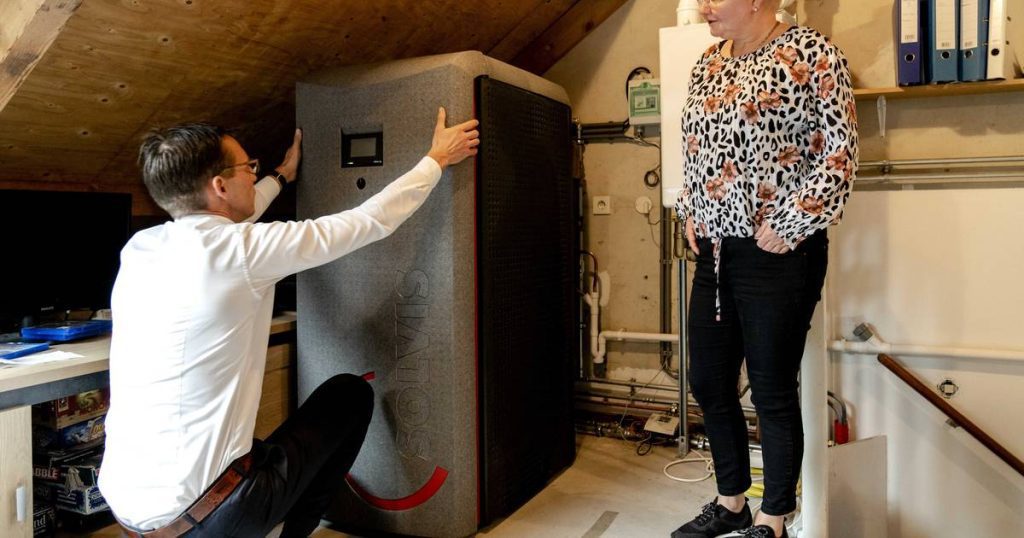LiviusDo you live in an old house, but would you also like to install a heat pump? Then you have to take into account several things. How do you know if you can connect a heat pump to your existing radiators? And how much extra insulation do you need? Livios Builder site helps you on your way.
Mild rejuvenation
If you only insulate the roof and replace some windows, your house will not be insulated enough for a heat pump. The heat pump heats up at a lower temperature. Because existing radiators are not compatible with the lower temperature of heating water, it becomes difficult to heat your home to room temperature during the winter.
There are many alternatives on the market that can significantly reduce heating costs: These are all renovation options for your heating installation.
1. High temperature heat pump
There are high temperature air-water heat pumps that you could theoretically install in a poorly insulated home. To reach the higher temperature, the compressor has to work more. As a result, you will use more electricity and the heat pump will become less profitable.
Additionally, an air-to-water heat pump operates less efficiently when the outside temperature drops below the freezing point. Even with this system, it would therefore be difficult to heat your home to a comfortable room temperature during the winter season.
The main difficulty lies in the size of the heat pump. On the other hand, it must be powerful enough to heat it during the coldest period of the year. On the other hand, it shouldn’t be too strong for the rest of the year.
If you still want to heat a poorly insulated home with a heat pump, it is best to keep the existing heating system and connect it to an air and water heat pump. It will heat your home with water at a low or medium temperature for much of the season, while a gas boiler will continue to produce hot water at a high temperature during the colder winter months.
So the heat pump runs through most of the year. The gas boiler is only operated during the cooler months. The old boiler’s poor efficiency isn’t much of a hurdle, since it will only run for a short period of the year.
Great renovation
Are you planning larger renovations? Then the choice of heat pump is more straightforward. With a comprehensive energy renovation, in which you treat the entire building envelope (roof, floor, walls, windows), a heat pump becomes a profitable investment. In addition, you will also have to improve airtightness and install a well-thought-out, high-performance ventilation system.
Do you choose a heat pump? Then you need a system that can operate at lower temperatures, such as underfloor heating, low-temperature radiators, or fan coil units. Even if you don’t install a heat pump right away, choosing a low-temperature heating system is appropriate.
This system also improves the efficiency of the condensing boiler and facilitates its subsequent replacement by a heat pump.
No budget for a heat pump (yet)? Read here how to keep options open.
Replace the electric heater
Many homes from the 1980s are fitted with separate electric radiators and/or electric accumulators. When you want to replace it, the heat distribution system is crucial.
Would you choose a central heating boiler with radiators? Then you should install a piping system to distribute the heating water and connect your home to the natural gas network (or install a propane or fuel oil tank). If you choose an air and water heat pump along with a low temp heat delivery system, you will also have to supply an entirely new piping system.
Do you choose an air to air heat pump? Then you have to supply piping with refrigerant that connects the outdoor unit to the indoor units. In an air-to-air heat pump, a fan blows warm air into the rooms. This is cheaper than a heating system with a central heating boiler and radiators. By reversing the operation of this heat pump, you can also use it for cooling.
An air-to-air heat pump can cause a noise disturbance. The heat pump outdoor unit produces about 40 dB of noise. For comparison: a dishwasher hits about 50dB and a car humps about 85dB.
With some air-to-air heat pumps, efficiency also drops in cold weather, which means they use a lot of electricity and can’t provide the desired comfortable temperature.
Not sure what type of heat pump to install? Read here which option is best for you, depending on your budget and living situation.
The winning combination: heat pump and solar panels
The vast majority of heat pumps consume electricity. With solar panels, you can produce electricity for the heat pump yourself. So the combination of solar panels and a heat pump is the most efficient way to provide sustainable heating. Not only does it provide you with significant energy savings, but it also reduces your impact on the environment.
advice: If you have a heat pump installed you may qualify for a Mijn VerbouwPremie. You can find terms and installment amounts here.
This article was written by our partner Livios.be. Livios.be is an expert site focused on construction and renovation.
Unlimited free access to Showbytes? Which can!
Log in or create an account and never miss a thing from the stars.

“Total coffee specialist. Hardcore reader. Incurable music scholar. Web guru. Freelance troublemaker. Problem solver. Travel trailblazer.”







More Stories
Bitcoin price rises after new jobs data from US
European stock markets open higher | beursduivel.be
Russia’s oil imports to China decline